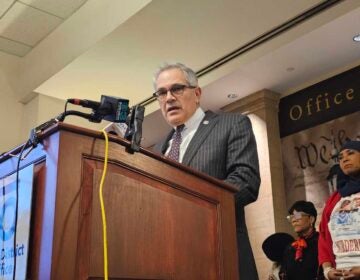Philadelphia deserves a good district attorney. What does that mean?

Philadelphia is about to enter a race to elect the most powerful person in the Pennsylvania criminal justice system. Philly being a Democratic stronghold, we will know who the next district attorney is likely to be after the Democratic primaries in May. As we begin to read about the candidates and the doings and misdoings of outgoing DA Seth Williams, before the candidate interviews and forums, it is important that we ask ourselves what makes a “good” DA?
The Judiciary Act of 1789 mandates that all states appoint “in each district a meet person learned in the law to act as attorney for the United States in such district … whose duty it shall be to prosecute in such district all delinquents for crimes and offences.” In essence, the DA is the city’s “top cop” and Pennsylvania’s top prosecutor. According to the Philadelphia DA website, the DA’s office “is responsible for the prosecution of over 75,000 criminal cases yearly.” Many choices in each one of those cases are left to the DA’s discretion:
- When to pursue criminal charges
- When to dismiss a case
- Which charges to pursue
- To seek the death penalty or not
- To offer (or pressure) a plea bargain or not
- To summon a grand jury or not
- When to bring in an independent prosecutor?
These are all questions that could change a person’s life trajectory, and all are left to the discretion of one person. In her best-selling book “The New Jim Crow,” Michelle Alexander notes that “no one has more power in the criminal justice system than prosecutors.”
Body, ballot, buck
Last week I had the opportunity to join a group of clergy, organizers, and leaders at the PICO National Network’s Live Free Campaign gathering in Oakland, California. Live Free is a faith-based social justice campaign to “end the criminalization of black and brown bodies” and to reduce the amount of incarcerated people of color and the number of people who are hurt by urban gun violence or at the hand of the police.
Live Free’s theory of change, known as “The Body, The Ballot, & The Buck,” is that each of us has the ability to organize, to control our own bodies, and show up to action; that we have the right to appear on and cast a ballot; and that we can use or not use our “buck,” or collective economic power, to create the change we seek. Local Live Free campaigns organize the bodies, ballots, and bucks in their area. In Philadelphia, POWER Interfaith is leading this effort.
The question “What makes a good DA?” was posed to the room. The two themes that came from the discussion were community and evidence-based practices.
Part of the community
A good DA comes from the community and has a stake in it. Prosecutors have a direct impact on the rate of mass incarceration growth. Every person incarcerated for a minor offense is another person torn away from the community.
A DA who has a vested interest in seeking alternatives to incarceration, such as restorative justice, is a good DA.
A district attorney who expresses interest in the reduction of over-policing in public schools, because kids from their community are in those public schools, will have a greater impact on dismantling the school-to-prison pipeline.
A DA must realize that, in the age of mass incarceration, formerly incarcerated people are members and leaders of our communities and should be in positions of power in the city and in the criminal justice system.
Re-entry is an almost impossible effort without community support, and slip-ups are almost guaranteed. However, locking up a person who has already served years behind bars, because of driving without a license or for selling a small amount of weed, without providing real jobs and housing opportunities for ex-prisoners, is not what it means to give a second chance.
Lastly, a DA who understands that they are also a part of the police community, and as such cannot be in charge of holding police accountable, but calls in an independent prosecutor to investigate cases of police brutality, is a good DA.
Evidence-based practices
The second aspect is evidence-based practices. We are stuck with archaic criminal justice practices such as pre-trial detention and stop-and-frisk. The prosecutor has a significant impact on such policies that are not evidence based. A report by the Brennan Center for Justice in NYU shows that stop-and-frisk in New York City was not statistically associated with reduction of crime. Why then does Philadelphia still stop and frisk its pedestrians (predominantly pedestrians of color)? The DA can affect stop-and-frisk by not laying charges on minor offenses that come from pedestrian stops.
The DA can also have an impact on pre-trial detention and bail, both shown to have increased crime and created bias against poor people in the criminal justice system. Although the decision to impose cash bail is left to the discretion of a judge, the DA is a part of the process all the way. After an arrest, the suspect is taken to a Philadelphia police station to be interviewed by a representative of the Bail Unit. In the interview, the interviewer sets the bail by placing the suspect into one of four risk categories and one of 10 categories based on the seriousness of the charges. The riskier the suspect and the more serious the charge, the higher the bail. Before appearing in front of a judge, the DA must approve of the charge.
A prosecutor from the DA’s office will also be in the room during the bail hearing and can push for higher bail and pre-trial detention, or seek an alternative. For example, in Virginia, a prosecutor offered that a group of teenagers that vandalized a historic Black schoolhouse with racist graffiti read a book a month and write book reports for the court. The DA can be a strong influence on criminal justice policy in Philadelphia. A good DA will follow evidence based practices and fight against discriminatory practices that have shown to cause more harm than good.
A new era of criminal justice reform
This is an opportunity for Philadelphia to pause and rethink our criminal justice system. With the announcement that Seth Williams will not seek re-election, we have an open DA race and an opportunity for a new era of criminal justice reform in our city.
We must elect a good DA, one who has stake in, is aware of, and is truly a part of the community — a DA who will push for evidence-based practices and push against practices that are not backed with evidence.
Lastly, we need a DA who can mutter the words “white supremacy.” From the 13th Amendment, to the existence of the FBI’s COINTELPRO, to Clinton’s crime bill to stop-and-frisk, race is the single most dominant factor to shape the criminal justice system. We need a DA who is aware of that.
We deserve a district attorney brave enough to argue that and who is strong enough to lead Philly to a new path. We deserve a good DA.
WHYY is your source for fact-based, in-depth journalism and information. As a nonprofit organization, we rely on financial support from readers like you. Please give today.




